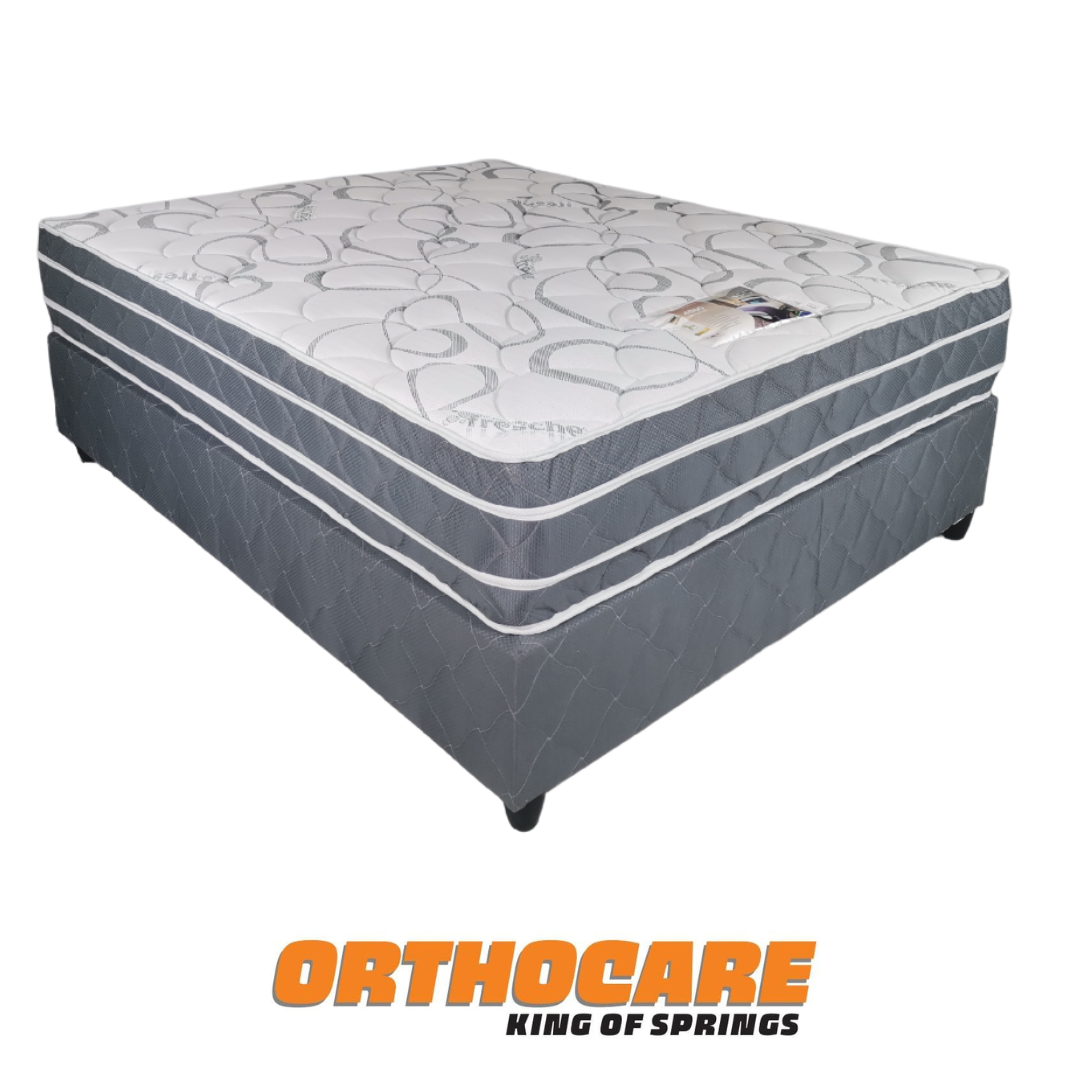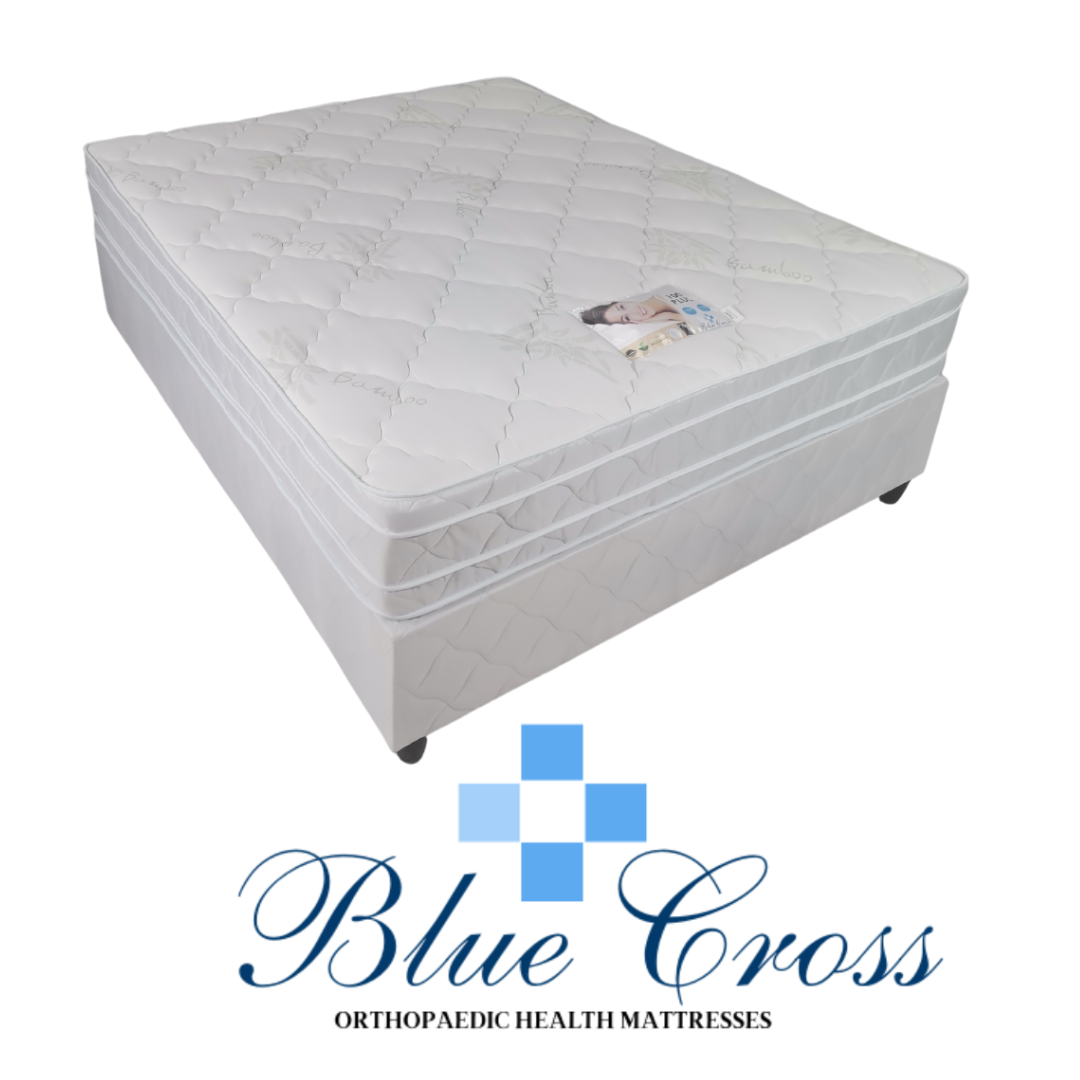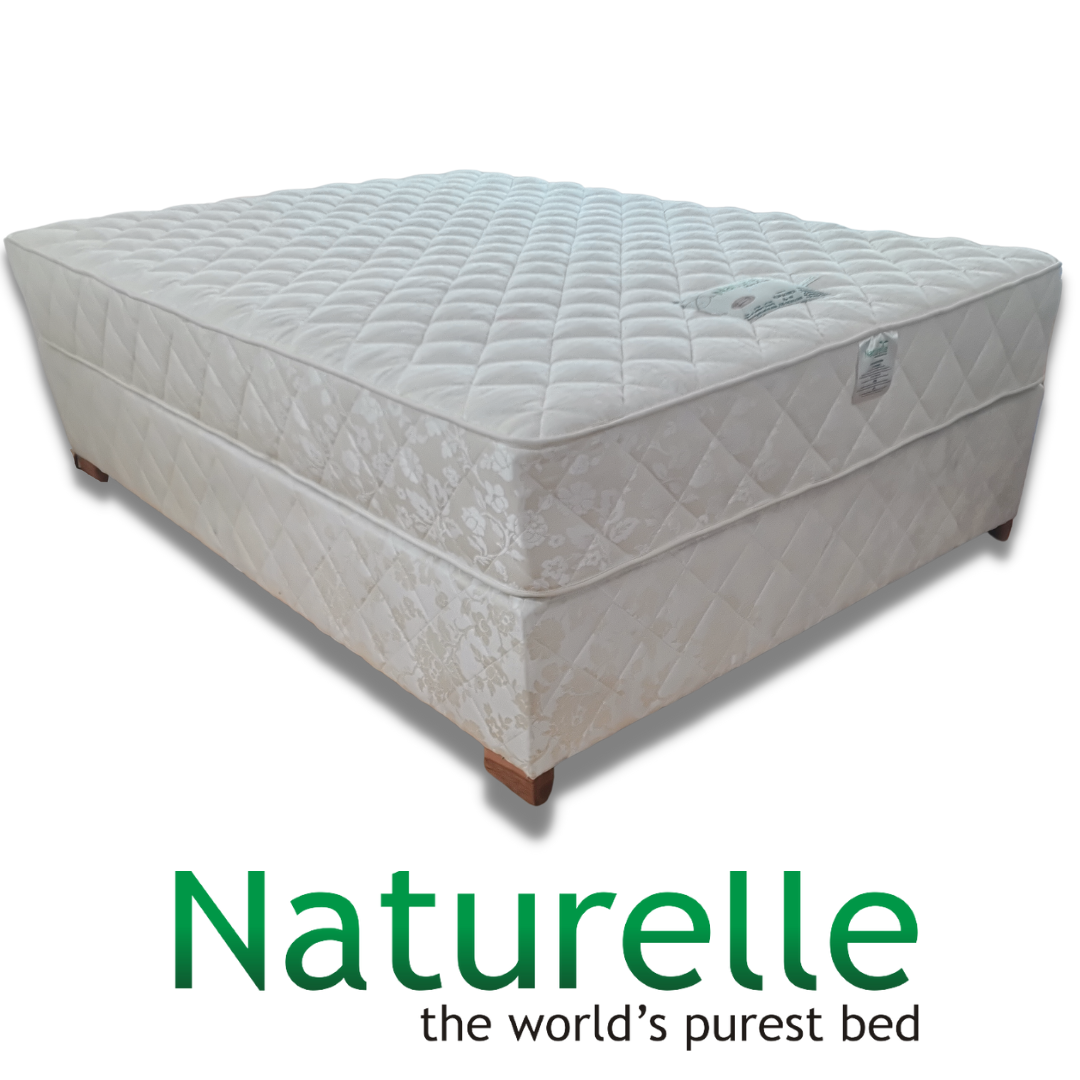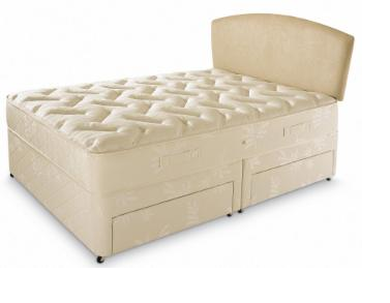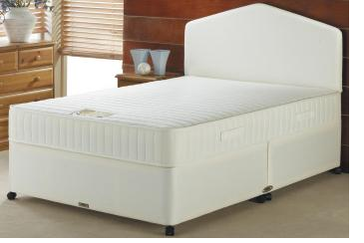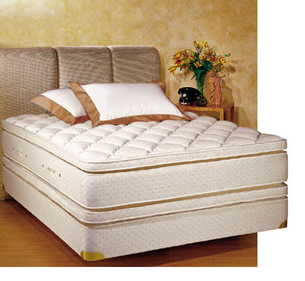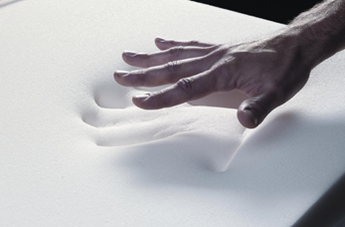
COMFORT DESIGN INNOVATION CONFIDENCE QUALITY
With so many bed companies out there today, it's hard to differentiate one from the other. However, by using technology that is both unique and different the Pocket Spring Bed Company stands out among the rest. We offer specialized technologies that guarantee a perfect nights rest. All our beds use pocket spring technology, with 600 to 1000 springs in each mattress, depending on the model. Each spring is surrounded in a fabric pocket and then joined in the hip to make up the mattress. This promises each individual an ideal undisturbed sleep – just what the doctor ordered! Butterfly springs are added to the perimeter to add stability and increase the actual sleeping surface of the mattress. Comfort fillings used in our pocket spring beds are the best money can buy. Remember that whatever your profile, our pocket springs love your shape!
With so many bed companies out there today, it's hard to differentiate one from the other. However, by using technology that is both unique and different the Pocket Spring Bed Company stands out among the rest. We offer specialized technologies that guarantee a perfect nights rest. All our beds use pocket spring technology, with 600 to 1000 springs in each mattress, depending on the model. Each spring is surrounded in a fabric pocket and then joined in the hip to make up the mattress. This promises each individual an ideal undisturbed sleep – just what the doctor ordered! Butterfly springs are added to the perimeter to add stability and increase the actual sleeping surface of the mattress. Comfort fillings used in our pocket spring beds are the best money can buy. Remember that whatever your profile, our pocket springs love your shape!
SOVEREIGN
Even though the Sovereign is the base model of the Pocket Spring Bed CO. range, it is defined by the magnificent spring system which lends its name to this bed. Utilising the 600 series spring unit, the Sovereign is a perfect bed for the discerning individual who desires a free-floating sleep experience.
Medium-Soft level of support.
Size Available: Standard & special - add 15% for extra length.
Weight rating: max 90kg per sleeping partner.
2 year guarantee & 20 year warranty
Turn-Free option Available: No
Medium-Soft level of support.
Size Available: Standard & special - add 15% for extra length.
Weight rating: max 90kg per sleeping partner.
2 year guarantee & 20 year warranty
Turn-Free option Available: No
CANONDALE
Mattress Construction
Going up in the world? The Canondale is tailor-suited to the couple seeking a firmer sleeping surface that won’t go saggy or lumpy through many long years of usage.
Firm level of support.
Size Available: Standard & special - extra length free of charge.
Weight rating: max 110 kg per sleeping partner.
2 year guarantee & 25 year warranty
Turn-Free option Available: Yes.
Going up in the world? The Canondale is tailor-suited to the couple seeking a firmer sleeping surface that won’t go saggy or lumpy through many long years of usage.
Firm level of support.
Size Available: Standard & special - extra length free of charge.
Weight rating: max 110 kg per sleeping partner.
2 year guarantee & 25 year warranty
Turn-Free option Available: Yes.
HIGHDALE
Mattress Construction
Glorious comfort and pure luxury are represented in the Highdale. Pure cotton ticking to absorb and distribute body moisture combined with a latexo filler on the tough-as-nails 1000 series spring system make the Highdale a superb option for the executive couple. Through the years the Highdale has continued to define the standards for ultimate luxury in the sleep industry.
Medium-Firm level of support.
Size Available: Standard & special - extra length free of charge.
Weight rating: max 120kg per sleeping partner
3 year guarantee & 30 year warranty; 3 + 30
Turn-Free option Available: Yes
Glorious comfort and pure luxury are represented in the Highdale. Pure cotton ticking to absorb and distribute body moisture combined with a latexo filler on the tough-as-nails 1000 series spring system make the Highdale a superb option for the executive couple. Through the years the Highdale has continued to define the standards for ultimate luxury in the sleep industry.
Medium-Firm level of support.
Size Available: Standard & special - extra length free of charge.
Weight rating: max 120kg per sleeping partner
3 year guarantee & 30 year warranty; 3 + 30
Turn-Free option Available: Yes
Wilson & Kennedy
Sleep like a baby tonight
THE MEMORY FOAM EXPERIENCE
Memory, or visco-elastic foam, is a special type of foam that responds to the body's temperature and then perfectly conforms to the body's shape. As the memory foam gently conforms to the body it redistributes the body's weight. More of the body is in contact with the sleep surface: The more square centimeters of contact, the less overall pressure per square centimeter. This conformability of the memory foam allows every square inch of the body to be supported and thereby significantly reduces skin pressure by as much as 50%. This improves the circulation, reduces pressure points as well as spinal pressure.
Sandringham
Upholstered with 600 grams per square meter of pure lamb’s wool/ fibre combination, then 35mm of high density memory foam over our 672 series pocket spring, or reborn foam, the Sandringham offers two levels of support, depending on your preference. Allow your body to nestle into its most natural sleeping position on the superb Sandringham.
Medium to medium firm level of support.
Mattress Depth 32cm.
Size Available: Standard & special - extra length free of charge.
Weight rating: max 115 kg per sleeping partner
2 year guarantee & 20 year warranty
Turn-Free option Available: Yes
Foundation: Firm top, 5000kg rated, six feet for additional support. Individual rib support with cross struts and corner bracing.
Edinburgh
Our unique memory foam spring mattress for consistent support and no roll together. After that comes a deep layer of visco-elastic memory foam and a layer of Latexo for additional comfort, developed from space-age technology, incorporated into the top layer of fillings.
A soft knitted mattress top layer allows the memory foam to cradle your body, while giving you the sensation that you are floating on cloud nine. Choose between our 1000series Pocket Spring, or our reborn polymer foundation.
Medium-Soft to Medium firm level of support.
Mattress Depth 34cm.
Size Available: Standard & special - extra length free of charge.
Weight rating: max 115 kg per sleeping partner
2 guarantee & 25 year warranty
Turn-Free option Available: Yes
Foundation: Firm top, 5000kg rated, six feet for additional support. Individual rib support with cross struts and corner bracing.
Buckingham
Upholstered with 600 grams per square meter of pure lambs wool& fibre combination, then 55mm of high density polymer-spring with PU Latex over our 1000 series pocket spring, the Buckingham offers the most discerning individual a combination of all that is required in for a perfect night’s rest. Honeycomb pocket springs offer no-disturb sleep for couples. Soft-knitted plush Belgian ticking add a generous portion of extravagance which will leave you feeling royally refreshed and ready for the challenges of the day. Simply put, Buckingham is the best of the best
Medium to Medium-Firm level of support.
Mattress Depth 30cm.
Size Available: Standard & special - extra length free of charge.
Weight rating: max 1 25 kg per sleeping partner
3 year guarantee & 30 year warranty
Turn-Free option Available: Yes
Foundation: Firm top, 5000kg rated, six feet for additional support. Individual rib support with cross struts and corner bracing.
Memory, or visco-elastic foam, is a special type of foam that responds to the body's temperature and then perfectly conforms to the body's shape. As the memory foam gently conforms to the body it redistributes the body's weight. More of the body is in contact with the sleep surface: The more square centimeters of contact, the less overall pressure per square centimeter. This conformability of the memory foam allows every square inch of the body to be supported and thereby significantly reduces skin pressure by as much as 50%. This improves the circulation, reduces pressure points as well as spinal pressure.
Sandringham
Upholstered with 600 grams per square meter of pure lamb’s wool/ fibre combination, then 35mm of high density memory foam over our 672 series pocket spring, or reborn foam, the Sandringham offers two levels of support, depending on your preference. Allow your body to nestle into its most natural sleeping position on the superb Sandringham.
Medium to medium firm level of support.
Mattress Depth 32cm.
Size Available: Standard & special - extra length free of charge.
Weight rating: max 115 kg per sleeping partner
2 year guarantee & 20 year warranty
Turn-Free option Available: Yes
Foundation: Firm top, 5000kg rated, six feet for additional support. Individual rib support with cross struts and corner bracing.
Edinburgh
Our unique memory foam spring mattress for consistent support and no roll together. After that comes a deep layer of visco-elastic memory foam and a layer of Latexo for additional comfort, developed from space-age technology, incorporated into the top layer of fillings.
A soft knitted mattress top layer allows the memory foam to cradle your body, while giving you the sensation that you are floating on cloud nine. Choose between our 1000series Pocket Spring, or our reborn polymer foundation.
Medium-Soft to Medium firm level of support.
Mattress Depth 34cm.
Size Available: Standard & special - extra length free of charge.
Weight rating: max 115 kg per sleeping partner
2 guarantee & 25 year warranty
Turn-Free option Available: Yes
Foundation: Firm top, 5000kg rated, six feet for additional support. Individual rib support with cross struts and corner bracing.
Buckingham
Upholstered with 600 grams per square meter of pure lambs wool& fibre combination, then 55mm of high density polymer-spring with PU Latex over our 1000 series pocket spring, the Buckingham offers the most discerning individual a combination of all that is required in for a perfect night’s rest. Honeycomb pocket springs offer no-disturb sleep for couples. Soft-knitted plush Belgian ticking add a generous portion of extravagance which will leave you feeling royally refreshed and ready for the challenges of the day. Simply put, Buckingham is the best of the best
Medium to Medium-Firm level of support.
Mattress Depth 30cm.
Size Available: Standard & special - extra length free of charge.
Weight rating: max 1 25 kg per sleeping partner
3 year guarantee & 30 year warranty
Turn-Free option Available: Yes
Foundation: Firm top, 5000kg rated, six feet for additional support. Individual rib support with cross struts and corner bracing.
Every body needs a good night's sleep, especially with the pressures of modern day living. Sleep fulfills a vital role in recharging our batteries and keeping us healthy. Yet surprisingly few people relate the quality of life to quality of sleep.
Your mattress is undoubtedly the single most used item of furniture in your home. From conception to our final moments, we find comfort and rest on our mattress. It is not possible to experience a good day after having spent the night on a poor mattress. In our lifetime we will spend up to 234 000 hours in our beds - that's 27 years! To withstand all the pressure of daily living, combined with the increasing need for a really good night's rest, you need to sleep on a great bed. If you don't, then your quality of life is much reduced.
Your mattress is undoubtedly the single most used item of furniture in your home. From conception to our final moments, we find comfort and rest on our mattress. It is not possible to experience a good day after having spent the night on a poor mattress. In our lifetime we will spend up to 234 000 hours in our beds - that's 27 years! To withstand all the pressure of daily living, combined with the increasing need for a really good night's rest, you need to sleep on a great bed. If you don't, then your quality of life is much reduced.
Our brands
How to buy a mattress.
You know you need a new mattress when:
• Your mattress is full of marks and stains, and you wouldn't want your neighbour to see it.
• There is a permanent imprint of your body, indentation or sag in the middle of the mattress which doesn't disappear when you get up.
• Your mattress or base squeaks, moans and groans when you sit or lie down.
• You are fighting for bed space because your bed is too small or you are rolling towards each other without planning to.
• Your mattress is in excess of ten years old.
What to look for in a mattress:
• DURABILITY - make sure the materials used are high quality as this will influence how long your mattress will provide you with good comfort and support.
• SOFT OR FIRM - which is the correct support for you individually. Remember each person has an unique shape and body structure, so mattresses are not "one size fits all". Also remember that one persons idea of firm differs to the next. Different manufacturers firmness levels are not the same.
• WEIGHT - all mattresses are weight rated. This means that they are designed to carry a certain number of kilograms per person. If your weight exceeds the kilogram rating of the mattress, per person, the mattress will not last as long and the support the mattress offers will be lessened.
• WARRANTY - a minimum of a 10 year warranty will ensure that the mattress is of a reasonable quality and will last. The warranty should ensure that the product be replaced or repaired in the case of a defective product.
• SPACE - space partly equates to comfort. Keep in mind the space constraints of the room where you want to put the bed. Buy the biggest bed you can for the space you have available. Keep in mind an extra length bed if you are taller than usual, this way your feet wont hang of the end of the bed.
Shopping for your bed:
• Don't dial for your bed. Whoever will be sleeping on the bed should go shopping for the bed. Take your sleeping partner with.
• Wear comfortable clothes when going shopping for your bed and remember you will need to lie down on the beds completely in order to gauge whether the support is too firm or too soft. This is subjective and personal, so be sure to lie on the bed yourself.
• Read the label on the bed to discover about features the bed may have that will be of value to you.
• Shop at a store you trust and where the salesperson is helpful and knowledgeable on all the products.
• Try and establish your budget before going shopping, but remember it may have been 10 years or more since you last bought a bed, so prices could be higher than you think.
• Familiarize yourself with bed styles and construction, ie. different technologies: bonnel springs, pocket springs, foam, memory foam, cotton, wool, latex.
• The "base or foundation", does your current one need replacing or can you buy the mattress only. Buying the mattress only will save you a substantial amount of money.
• Be aware of gimmicks such as: trade - ins, excessive discounts, free pillows, free beds etc. What you want is the best value for money.
• Most important of all, personal preference, don't be swayed by sales talk. The bed that is comfortable for you is the one you should buy.
You know you need a new mattress when:
• Your mattress is full of marks and stains, and you wouldn't want your neighbour to see it.
• There is a permanent imprint of your body, indentation or sag in the middle of the mattress which doesn't disappear when you get up.
• Your mattress or base squeaks, moans and groans when you sit or lie down.
• You are fighting for bed space because your bed is too small or you are rolling towards each other without planning to.
• Your mattress is in excess of ten years old.
What to look for in a mattress:
• DURABILITY - make sure the materials used are high quality as this will influence how long your mattress will provide you with good comfort and support.
• SOFT OR FIRM - which is the correct support for you individually. Remember each person has an unique shape and body structure, so mattresses are not "one size fits all". Also remember that one persons idea of firm differs to the next. Different manufacturers firmness levels are not the same.
• WEIGHT - all mattresses are weight rated. This means that they are designed to carry a certain number of kilograms per person. If your weight exceeds the kilogram rating of the mattress, per person, the mattress will not last as long and the support the mattress offers will be lessened.
• WARRANTY - a minimum of a 10 year warranty will ensure that the mattress is of a reasonable quality and will last. The warranty should ensure that the product be replaced or repaired in the case of a defective product.
• SPACE - space partly equates to comfort. Keep in mind the space constraints of the room where you want to put the bed. Buy the biggest bed you can for the space you have available. Keep in mind an extra length bed if you are taller than usual, this way your feet wont hang of the end of the bed.
Shopping for your bed:
• Don't dial for your bed. Whoever will be sleeping on the bed should go shopping for the bed. Take your sleeping partner with.
• Wear comfortable clothes when going shopping for your bed and remember you will need to lie down on the beds completely in order to gauge whether the support is too firm or too soft. This is subjective and personal, so be sure to lie on the bed yourself.
• Read the label on the bed to discover about features the bed may have that will be of value to you.
• Shop at a store you trust and where the salesperson is helpful and knowledgeable on all the products.
• Try and establish your budget before going shopping, but remember it may have been 10 years or more since you last bought a bed, so prices could be higher than you think.
• Familiarize yourself with bed styles and construction, ie. different technologies: bonnel springs, pocket springs, foam, memory foam, cotton, wool, latex.
• The "base or foundation", does your current one need replacing or can you buy the mattress only. Buying the mattress only will save you a substantial amount of money.
• Be aware of gimmicks such as: trade - ins, excessive discounts, free pillows, free beds etc. What you want is the best value for money.
• Most important of all, personal preference, don't be swayed by sales talk. The bed that is comfortable for you is the one you should buy.


